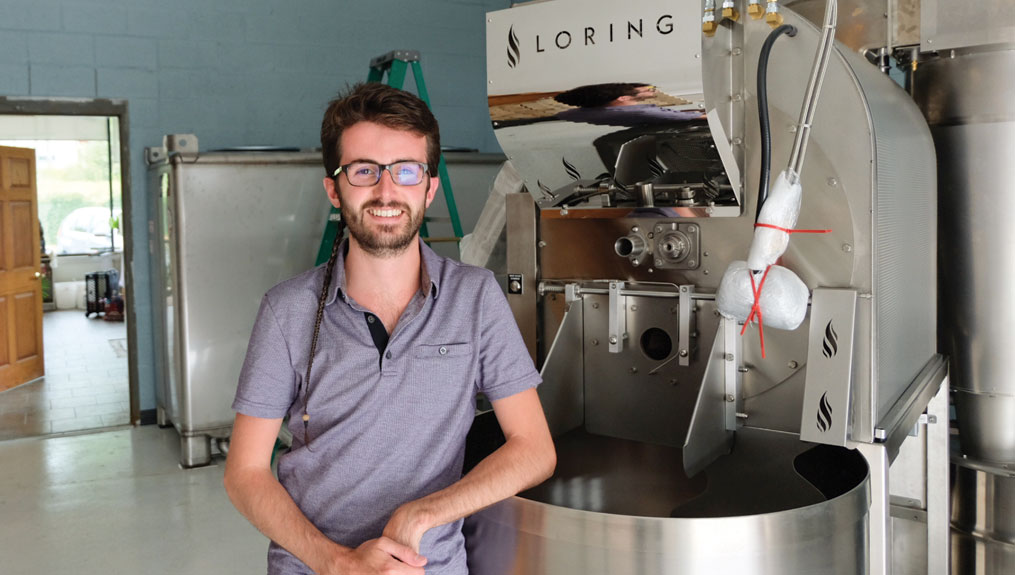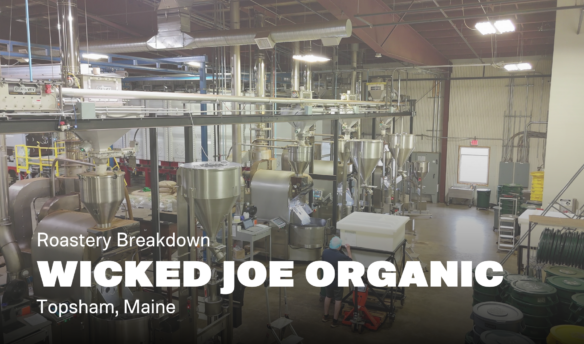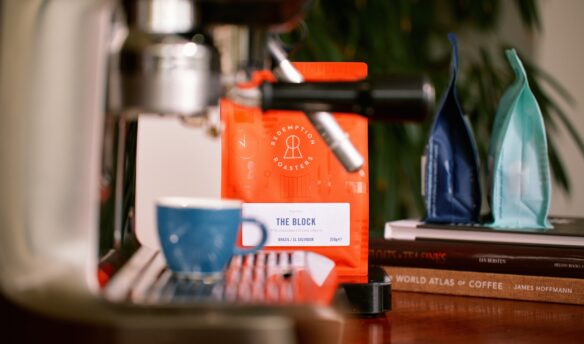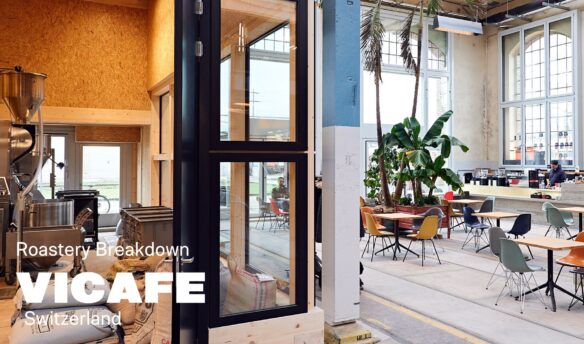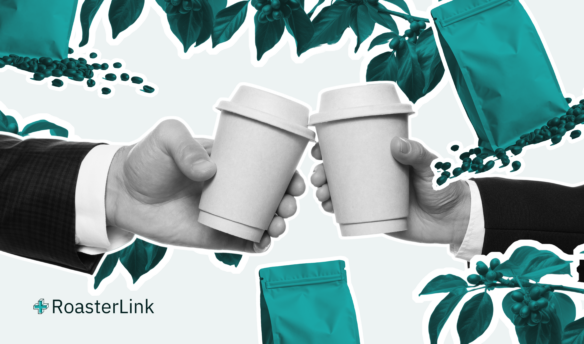Sam Schaefer. All photos by Fionn Pooler
[U]p until 2009, Sam Schaefer had been a self-declared “iced latte, sugary coffee, into-the-culture kind of drinker.” But it was that year, during a visit to Madcap Coffee, he was introduced to specialty coffee—and now, 10 years later, hasn’t looked back.
“I was still in high school in Grand Rapids,” says Schaefer. “I had gone to Madcap and it was brand-new at the time—their branding was different, their packaging was different. And I finally tried a cafe miel. I drank this thing and I was like, ‘This is different.’ And from that moment on I was fascinated by how it was made, I was fascinated by the people behind the counter, and I was fascinated by the equipment.”
Being a barista—let alone the founder of a coffee company—was never the plan for Schaefer.
“I had calculated my life in such an opposite direction,” he says. “I thought I was going to become a musician.”
That changed when he moved to Ann Arbor to study Performing Arts Technology at the University of Michigan. To help pay for school, he took a job at Michigan-headquartered chain Biggby Coffee. He quickly moved on to The Common Cup, and from there to Mighty Good Coffee, where he eventually became lead trainer and lead barista before leaving to work in sales and quality control for Stovetop Coffee Roasters in 2017.
He’s also an avid coffee competitor, having participated in the United States Barista Championship each year since 2017, making the semifinals this past season.
During that semifinal routine, Schaefer announced his intended new project, Mockingbird Coffee. A roastery and tasting room tucked away beside the train tracks on Ann Arbor’s West Side, Mockingbird was set to begin roasting and serving this fall. However, as of August 23, the business came to an abrupt halt, as Mockingbird’s investor had a change of heart. Although Schaefer retains the brand and intellectual property, the future of Mockingbird is now uncertain.
https://www.instagram.com/p/B1wOoy3FjB4/
Schaefer sat down with Fresh Cup to talk coffee, competitions, community—and what happens when your dreams are suddenly sidelined.
[This is an updated interview from the September 2019 issue of Fresh Cup.]
Fresh Cup: Tell us a bit about first getting started as a barista.
Sam Schaefer: I applied at every single specialty coffee shop in Ann Arbor, [but] my hours were too restrictive I think….I got a job at Biggby and learned a ton about the infrastructure and logistics of operating a cafe, and I didn’t think I would learn that. I was really working there to get something on my resume to convince someone else. And shortly after that, right before the end of 2013, I got a job at the Common Cup.
That was the exact opposite of Biggby. There was no training, no infrastructure, but there was all of the equipment, all of the nice coffee. And I had downloaded a lot of books on coffee and started just experimenting. So that was an amazing little playground.
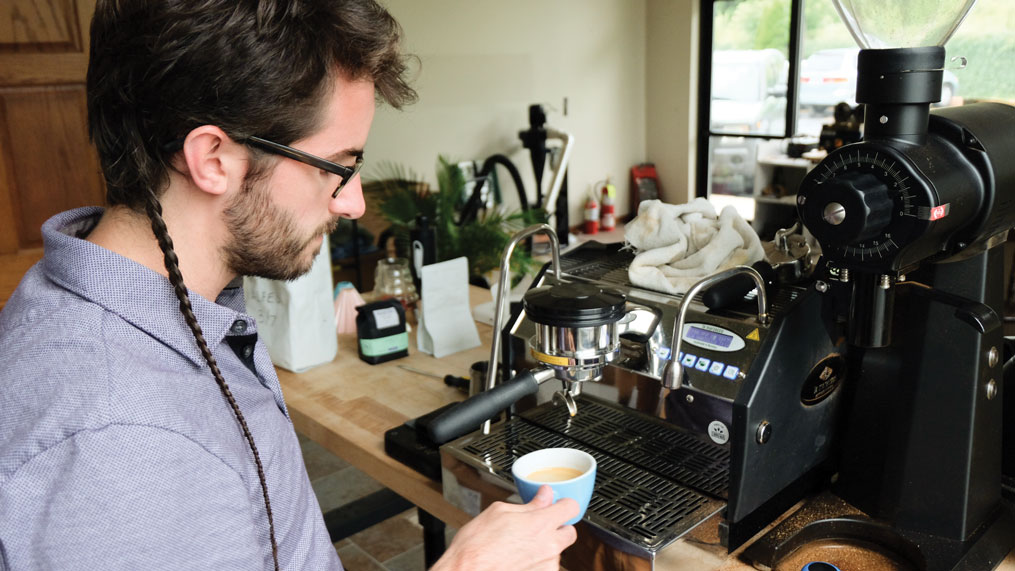
When did you decide to start competing?
Technically the very first Barista competition I attended, I was judging; I did a whole year of technical judging. I kinda got into the competition circuit by judging, and I got hooked on the entire culture. And then the following year, in the fall of 2017, right before I left Mighty Good, I actually did the very first preliminary round at Quills Coffee in Louisville. I was mostly an independent competitor in terms of support—I bought everything myself, I paid for my whole way.
I took a job at Stovetop Roasters basically right after that competition, and they sponsored me to compete. And I helped coach my coworker, Mike [Greene], and we both made it to the United States Barista Championships [in 2018]. I think I got like 21st or 23rd place or something and Mike got 10th place that year. We kind of were just helping each other. It was a very exciting and humbling time because neither of us felt super qualified to be there, but we weren’t going to stop at anything to be as good as we could be.
And then this past year, the 2019 season, I competed for Stovetop and made it to the United States Barista Championships again. I was starting Mockingbird during preparations for finals, and actually made the announcement of my company part of my routine. So you could say the company started at the semifinals of the United States Barista Championship.
Will you continue competing?
I am so hooked. The reason I started competing was because of what coffee competitions had done for me as a barista or just even as a consumer. I had been watching them on the live streams and keeping up with them ever since I started drinking coffee. The baristas at Madcap were competing and I had been anticipating this competition, not necessarily determined to do it, but there are a few people in the coffee competition circuit over the last decade or so that have really made competition a space for celebration of what we do and inspiration for how we can do it better. And I think that propelled me to want to do coffee at all.
And I’m just happy to be a part of a group of people that are trying so hard to find a better way to sustain or innovate or create what we all love. The reason I chose to compete is because I felt like I could pass on that torch, or I could continue that message for more people. The scores or the trophies or whatever is fun, but I really love listening to what people have to say, and I take that stuff to heart. So I will compete again and I hope I have something better to say than I did the year before.
So, Mockingbird. Had you been planning this for a while?
I think once I started working in coffee, the dream was that someday I’d have a business of my own. I come from an art background and a music background, so the lure for having my own business was not money or control or power or whatever. It was that I could put a unique stamp on what I do and share something with someone else. But a lot of the things I’ve dreamed about have just been copycats of shops I’ve really loved, and thankfully I’ve evolved over time. Mockingbird is nothing like some of those original ideas.
I’m really drawn right now to curating roasted coffees for a community. I’m really excited for Mockingbird to be about sharing specific kinds of coffees, and helping people experience and understand coffee in a deeper way through that curation. And also we’ll have a tasting space, so I’m really excited to just curate an environment where people can enjoy coffee, try coffee, learn more about coffee.
…
Mockingbird is a business idea, or experiment, in what could make the specialty coffee supply chain more viable from the end of the chain backwards. And that means higher prices, and it means a more specific experience. I think business is often even more powerful than community service or politics, and we’re hoping to use that leverage for good.
What did you see as Mockingbird’s role in the local coffee community?
We definitely have a lot of ideas for how can we support the local baristas and how can we provide access to more information and help empower people who feel isolated or stuck because that is definitely a narrative that I’ve had in my coffee journey.
A big thing at Mockingbird is understanding the importance of cooperation or collaboration, and we want to make that a factor in how and why we host educational events. We definitely want to host educational events for coffee professionals as well as for consumers.
I’m excited to be able to provide a lot of the stuff that I wish I could’ve had when I was just a barista making $10 an hour and going to college.
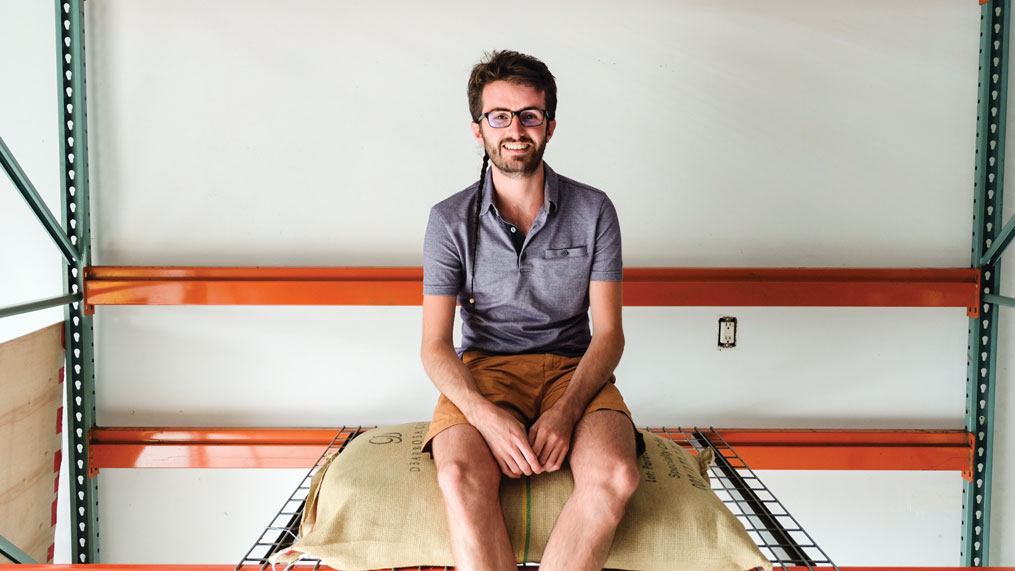
Can you tell us what happened with Mockingbird?
My business partner was also our sole investor. Over the process of supporting me through building out our company, he realized what he thought he understood about specialty coffee was very wrong. He rapidly began looking [more closely] at our project, and realized that he needs to make more money off his investment, and faster than we both projected and agreed upon starting this company. His personal dream project is starting up in 2020, and he realized it’s really one or the other for him, so he made the decision to close down Mockingbird, and hopes to liquidate everything to make back as much money as possible. This decision happened fast, and abruptly. We were left with no option to react or find alternative solutions.
Where will you go from here? What does the future look like?
We need to find employment. We were not able to work on this project without pay, and our payroll was cut off immediately. We hope to find a new way to carry on the mission and values of Mockingbird Coffee. We want to find a way that preserves our project, and protects it from outside investment. We are also scared, devastated, and oddly relieved. We aren’t giving up on coffee, but we are unsure of what to do next.
I am still considering doing the barista competition, and I’m hoping to stay connected to the greater coffee community, whether it’s on business or personal time. Viable coffee careers are really tough to come by in Michigan; that’s the saddest part, personally. Mockingbird was (and is) going to be a place that creates opportunities for as many people as possible to work careers they love, for pay they deserve, and in environments that inspire their best selves. I want that for myself. I want that for all of coffee. I want that for our world.



